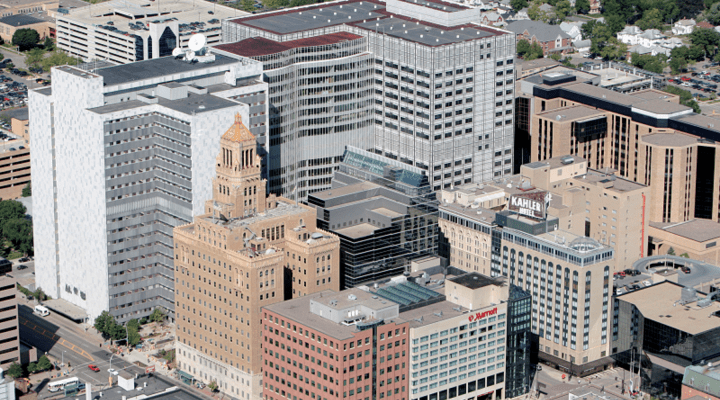
Mayo Clinic’s hometown looks to become the ‘Silicon Valley of medicine’
Mayo Clinic’s hometown looks to become the ‘Silicon Valley of medicine’

If you head directly south from St. Paul, Minnesota, you’ll eventually find yourself in Rochester, home of the world-renowned Mayo Clinic.
For more than 100 years, the city and the hospital have been synonymous. And now, a massive economic development project backed by Mayo, the city and the state aims to transform the city of more than 100,000 into a magnet for startups and entrepreneurs in medicine and other fields.
Mayo BioBusiness Center Chair Jim Rogers said Rochester’s transformation is already apparent.
“I can count — just about every building has a new business in the last four of five years, it seems,” he said. “It’s incredible what’s occurring here.”
In an effort to turn the region into the “Silicon Valley of medicine,” Rogers said change is happening inside the clinic’s walls, too.
Recently, Mayo lifted policies that blocked employees from owning or holding an executive position with a medical company, and a business accelerator helps employees develop new products. Rogers pointed to a couple of examples: a health records system for the intensive care unit and a less-invasive procedure to treat carpal tunnel syndrome, both products of Mayo’s efforts to support innovation.
In the Rochester of the future, Rogers said more products like these will be developed in Discovery Square, a downtown tech park where the idea is for Mayo employees, startups and major medical firms to collaborate.
“Gone are the days where a company comes, wants to talk to a few physicians, thinks they have a good idea and they run off and develop a product that doesn’t meet the patient need,” Rogers said. “Gone are the days we think we can just do it ourselves. It needs to be partnership.”
Discovery Square is part of a 20-year economic development effort to remake Rochester so Mayo can better compete for patients and top talent. The state, city and Mayo, as well as other private investors, will contribute a total of about $6.5 billion over the life of the project.
The effort is also meant to help diversify southeast Minnesota’s economy beyond health care. Right now, Mayo is the state’s largest employer, with more than 30,000 people in the region on its payroll. But to build its reputation as something more than a medical hub, some believe Rochester’s culture needs to change.
“When you have a large medical institution like the Mayo Clinic — a world renowned, top medical institution in the world — you get that way by eliminating risk,” said Jamie Sundsbak, who manages a co-working space for startups in Rochester’s downtown. “If you look at some of the entrepreneurial communities, risk is what they are excited about.”
Mayo’s ambition to make Rochester a magnet for innovation has great potential, said Michael Gorman, who is managing director with venture capital firm Split Rock Partners in the Twin Cities area.
But Gorman said a robust workforce is also critical. “One of the questions any entrepreneur, let alone an investor asks is, ‘Is this company located in a spot where we are actually able to scale and grow the business?’” Gorman said.
As Rochester moves beyond medicine, Gorman said the city will be in tough competition for tech-savvy professionals. And Rochester already has a shortage of those workers.
“There’s certainly a talent gap,” said Mike Rolih, who founded Rochester’s GoRout, a company that produces technology that allows football coaches to communicate with players from the sidelines during practice. “It’s like a Grand Canyon.”
This year, Rolih said he’s ready to ramp up sales and needs more skilled workers. Finding them is proving difficult, and he’s worried his backers will pressure him to move to cities in nearby Wisconsin or Illinois.
“We want you to come to Chicago, or we want you to go to Madison where you’ve got a ready and willing workforce, because you have a young workforce, and you have ready and willing talent that you don’t have to fight Mayo for,” Rolih said.
If GoRout thrives in Rochester, it could help alter the city’s fortunes. Venture capitalist Gorman said Rochester needs just a few success stories to become the magnet for innovators that it wants to become.
There’s a lot happening in the world. Through it all, Marketplace is here for you.
You rely on Marketplace to break down the world’s events and tell you how it affects you in a fact-based, approachable way. We rely on your financial support to keep making that possible.
Your donation today powers the independent journalism that you rely on. For just $5/month, you can help sustain Marketplace so we can keep reporting on the things that matter to you.












